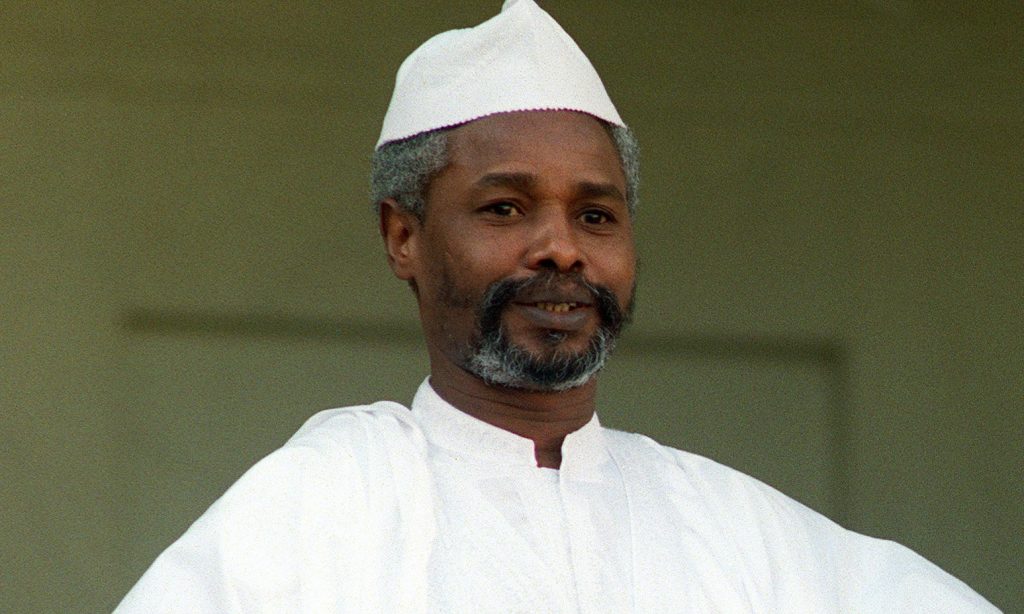
Photograph: Patrick Hertzog/AFP/Getty Images
The former dictator of Chad has been ordered to pay millions of dollars to victims of rape, torture and bereavement by a court in Senegal.
Hissène Habré, who in May was convicted of crimes against humanity by the Extraordinary African Chambers, a court set up specifically to try him, must pay his victims up to $34,000 (£25,627) each, ordered the judge, Gberdao Gustave Kam.
As president of Chad in the 1980s, Habré built a system where thousands of civilians were arrested and held arbitrarily for years in appalling conditions, and often tortured and raped. He personally oversaw the secret police that meted out punishment, giving many orders and even raping a woman himself four times.
The total he has been ordered to pay breaks down as 20 million Central African francs ($33,898) for each survivor of rape and sexual slavery, 15 million francs ($25,424) for each survivor of torture and arbitrary detention and each mistreated former prisoner of war, and 10 million francs ($16,949) for the surviving family members of victims.
This money has the power to transform the lives of those who spent years barely surviving in Habré’s notorious jails, and decades keeping silent about the abuse they had suffered. Many of the 4,733 victims involved in the case are poor, having never been compensated before. In many cases, they have emerged from prison to find they have lost the little they had.
“Money will never bring back my friends,” said Souleymane Guengueng, who almost died of suffocation several times in jail, and vowed, as he watched fellow inmates die of hunger and disease around him, to fight for justice. “But money is important to heal the wounds, to take victims out of poverty, and to show that we have rights that must be recognised.”
Guengueng founded the Association of Victims of Crimes of the Regime of Hissène Habré, and painstakingly collected testimonies from hundreds of victims, years before a trial seemed possible.
It is unclear where the money will come from, as just two small bank accounts and a house were seized by the Senegalese government when Habré was arrested, worth a combined total of less than $1m.
When Habré was ousted in a coup, he stole 3.32bn francs ($5.7m at today’s rates) from the national treasury the day before he fled the country for Senegal, according to a Chadian truth commission. Overall, however, he is thought to have taken substantially more. The cash gifts received by Habré during his period in office are understood to have included a $1m payment from Saddam Hussein. He allegedly spent considerable amounts buying political influence in his two decades living in Dakar, but it is not known where the rest of the money is hidden.
Campaigning groups including Amnesty and Redress called for the international community to donate to a trust fund for the victims, in case the amount of compensation raised by Habré’s assets was not enough.
“It’s crucial that Chad and the international community, particularly those who contributed towards the cost of Habré’s trial, do not abandon his victims now, when they are closer to receiving the full justice they deserve,” said Carla Ferstman, the director of Redress.
Last year, a court in Chad ordered the country’s government to pay compensation to victims of Habré’s agents in the secret police, after they were convicted of multiple crimes. None of this has been paid, nor has the government indicated its plans.
“The government of Chad must contribute its part of the $125m reparations ordered last year by the country’s court to 7,000 victims in a case convicting 20 Habré-era agents on counts including murder, kidnapping and torture,” said Erica Bussey, Amnesty International’s Africa senior legal advisor.
The amount that Kam awarded the victims falls well short of the $287m that the victims’ lawyers had asked for, and there was no allocation of money for collective compensation, which they had requested to build a memorial.
Habré was sentenced to life in prison, his trial the first conviction of a former head of state by an African court for crimes against humanity.
The court was set up by the African Union and Senegal, with extra funding from Chad, the EU, the US and other countries. A judge from Burkina Faso presided over Habré’s trial.
